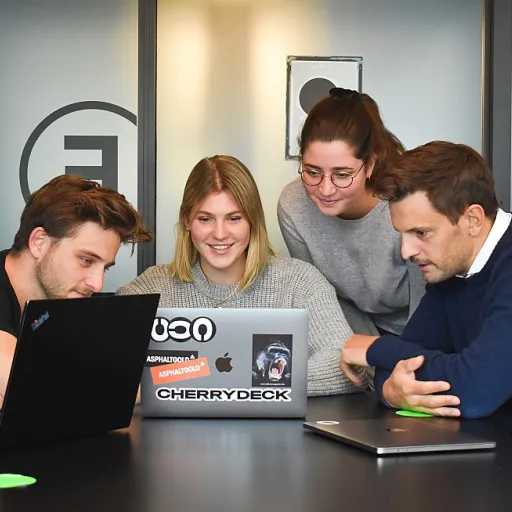
The Rise of Creative Job Titles
The emergence of inventive job titles
In the ever-evolving landscape of remote work, the rise of creative job titles has become a notable trend. This phenomenon is gaining momentum as companies endeavor to showcase their unique culture and attract top talent in a competitive market. These inventive titles go beyond the traditional labels such as manager, associate, or developer, offering positions like Chief Happiness Officer or Head of Customer Experience.
Creative job titles serve not only to redefine roles but also to enhance the sense of identity and belonging within a company. They reflect the values and mission of the organization, making them particularly appealing in the digital and creative industries where job titles such as Digital Media Manager, Graphic Designer, and Social Media Specialist are prevalent. By embracing such titles, companies signal to potential candidates that they value innovation and non-traditional approaches.
Furthermore, these titles often encompass a blend of responsibilities and skills that extend beyond the scope of standard roles. For instance, a Full Stack Developer might be reimagined as a Software Developer Specialist, underscoring a more holistic approach to job functions. Similarly, titles like Customer Service Ninja or Retail Sales Guru imply a level of expertise and effort that extends beyond conventional expectations.
However, while the rise of these amusing job titles generates excitement, it also presents certain challenges and considerations for companies and job seekers alike. These need to be carefully balanced to ensure they foster a cohesive and positive company culture that boosts employee engagement and satisfaction. As more companies adopt these inventive titles, it's important to keep in mind the broader implications on the workplace environment.
Impact on Company Culture
Transformative Influence of Playful Designations
The emergence of playful and inventive job titles, such as 'Chief Happiness Officer' or 'Full Stack Wizard', has begun to reshape how companies perceive and cultivate their workplace environments. In the context of remote work, such creativity can significantly influence company culture by fostering an atmosphere that is both innovative and adaptable. Injecting a sense of humor into job titles can break down traditional hierarchies and cultivate a more inclusive atmosphere. This not only makes the company appear more approachable but also aligns with modern, agile business development strategies. Often seen in roles like 'Chief Experience Officer' or 'Digital Media Guru', these creative titles reflect the dynamic nature of remote workspaces where traditional boundaries are increasingly blurred. Furthermore, this practice can reflect the company’s values by embedding a sense of fun and engagement directly into the job postings and overall workplace ethos. Consider a 'Head of Social Vibes,' a title that not only intrigues potential employees but also signals a forward-thinking approach to culture. However, as delightful as these titles can be, they must still accurately reflect the responsibilities and expectations of the role to avoid confusion. For companies exploring these creative waters, it’s crucial to navigate the possible misunderstandings associated with such titles carefully. Misinterpretations may weaken the perceived professionalism of the organization if not clearly defined or used in appropriate contexts. This balance between creativity and clarity is essential to maintaining a positive company culture that supports both humor and productivity. In remote environments, where communication nuances can easily be misinterpreted, recognizing the boundaries and implications of language and terminology becomes crucial. For deeper insights, consider exploring how to navigate complex communication scenarios in virtual settings here.Employee Engagement and Satisfaction
Boosting Morale and Job Satisfaction
Creative job titles are not just a fun addition to the workplace lexicon; they also play a crucial role in enhancing employee engagement and job satisfaction. When employees receive amusing and unique titles like 'Chief Happiness Officer' or 'Head of Customer Delight,' they often feel a greater sense of ownership and pride in their roles. Having a quirky job title can be an effective tool for long-term employee engagement. It tends to resonate well with professionals who enjoy breaking the monotony found in traditional titles like 'Office Manager' or 'Sales Associate.' By redefining their roles in a more engaging manner, employees not only enjoy a heightened sense of morale but also develop stronger connections to their work culture. Moreover, these job titles can foster a sense of community among staff. For example, if another role is creatively recognized, like a 'Media Manipulator Manager,' it may inspire others to strive for similarly tailored titles, enhancing workplace camaraderie. This can ultimately lead to better collaboration and creativity within teams. For those in the tech industry, having titles such as 'Full-Stack Wizard' or 'Software Developer Extraordinaire' can enhance a developer's confidence and highlight their specialized skills. Many find these amusing titles memorable, boosting not only individual morale but also attracting external attention towards company culture. As companies navigate this playful approach to rebranding job roles, they are advised to strike a balance. It's important that the titles stay aligned with the job description and responsibilities, ensuring clarity while enhancing positive company culture. For more insights on how playful elements like creative job titles compare with more traditional approaches, consider reading about the dynamics of halo remote work.Challenges and Considerations
Tackling the Quirks of Unusual Job Titles
In the vibrant landscape of remote work, the emergence of amusing job titles can sometimes present challenges for managers and employees alike. While creative titles like "Chief Happiness Officer" or "Digital Media Specialist" bring a sense of novelty and distinction, they may occasionally pose hurdles in more traditional aspects like hiring and professional recognition. First off, these eccentric titles can create misunderstandings. For instance, a "Manipulator Manager" in the context of social media might actually refer to a manager specializing in social media manipulation skills. The novelty can embed confusion if not well explained to new recruits or partners from outside the organization. Another subtle challenge is the alignment with external stakeholders and customers. Job titles such as "Full Stack Software Developer" or "Sales Associate" easily translate across industries, providing clarity and fostering trust. Yet, creatively constructed ones could prompt skepticism or misinterpretations until properly understood. Moreover, leaders like the CEO or managers juggling these unique titles might need to explain the roles in ways that align them with industry standards. This is critical, especially when companies are engaging in partnerships or business development. A "Chief Media Officer" title, for example, might require clarification even within informal exchanges to help ensure seamless communication and mutual understanding. Lastly, considering branding ramifications is paramount. While these roles add a personable touch to the company culture, maintaining a balance with communicative effectiveness is essential. For instance, a "Head Customer Experience Evangelist" can successfully highlight a company's commitment to customer delight, but only if the title carries meaning that resonates with audience perceptions. By thoughtfully addressing these considerations, remote work environments can embrace amusing job titles while ensuring that they enhance rather than detract from professionalism and credibility.Examples of Amusing Job Titles
A Look at Unconventional Designations
In the realm of remote work, amusing job titles have become a hallmark of modern corporate culture. These titles not only enhance the zest of work environments but also reflect the evolving nature of professional roles. It's interesting to see how creativity extends from executive positions to entry-level posts.
A Chief Happiness Officer, for instance, might not be found in a traditional office setting but has carved a niche in companies prioritizing employee well-being. Similarly, you may encounter a Manipulator Manager in tech-driven organizations, emphasizing innovative problem-solving over conventional management skills.
For those in tech and digital roles, monikers like Full Stack Wizard or Software Developer Extraordinaire can transform mundane tasks into magical endeavors. Meanwhile, in the creative sector, professionals such as Graphic Designers might embrace titles like Visual Storytellers, which underscore their crucial role in brand narratives.
Social media professionals take it a step further with distinctive titles such as Media Specialist or Manager Social Strategies, which not only convey their expertise but also add a dash of charisma to their profiles. As companies continue to adapt to remote-first models, the emergence of quirky titles in social media teams like Social Media Sorcerer hints at the playful yet pivotal nature of their roles.
In retail realms, roles like Retail Sales Guru inject personality into sales associate and sales rep positions, suggesting both expertise and customer engagement skills. It's an appealing way to attract talent who thrive in dynamic and people-centric environments.
In essence, the incorporation of creative job titles is more than just a trend—it's a transformative approach that energizes company culture and enhances employee satisfaction. This shift is driven by a desire to foster a work atmosphere that is not only productive but also enjoyable.
Tips for Creating Your Own Amusing Job Title
Crafting Your Own Unique Job Title
Creating an amusing job title that resonates with your role and personality is an art. Here are some practical tips to guide you through the process:- Be True to Your Role: While creativity is encouraged, ensure your title reflects the essence of your responsibilities. If you're a software developer, "Coding Wizard" might suit, but "Chief of Clouds" could be too ambiguous.
- Align with Company Culture: Before crafting a flashy title, consider the overall company ethos. A "Happiness Officer" might be well-received in a startup prioritizing employee well-being, whereas it may not fit a more traditional corporation.
- Consider Clarity and Communication: Amusing titles should be memorable but not confusing. A person outside your organization should quickly understand your primary responsibilities from your title.
- Collaborate and Consult: Engage with your team or HR to brainstorm job titles that embody your role while enhancing the company's creative image. This collaborative approach can also boost employee engagement and satisfaction.
- Test the Appeal: Discuss potential titles with colleagues, managers, and even clients. Feedback can help you gauge whether a title like "Media Specialist Extraordinaire" leaves a positive and professional impression.













